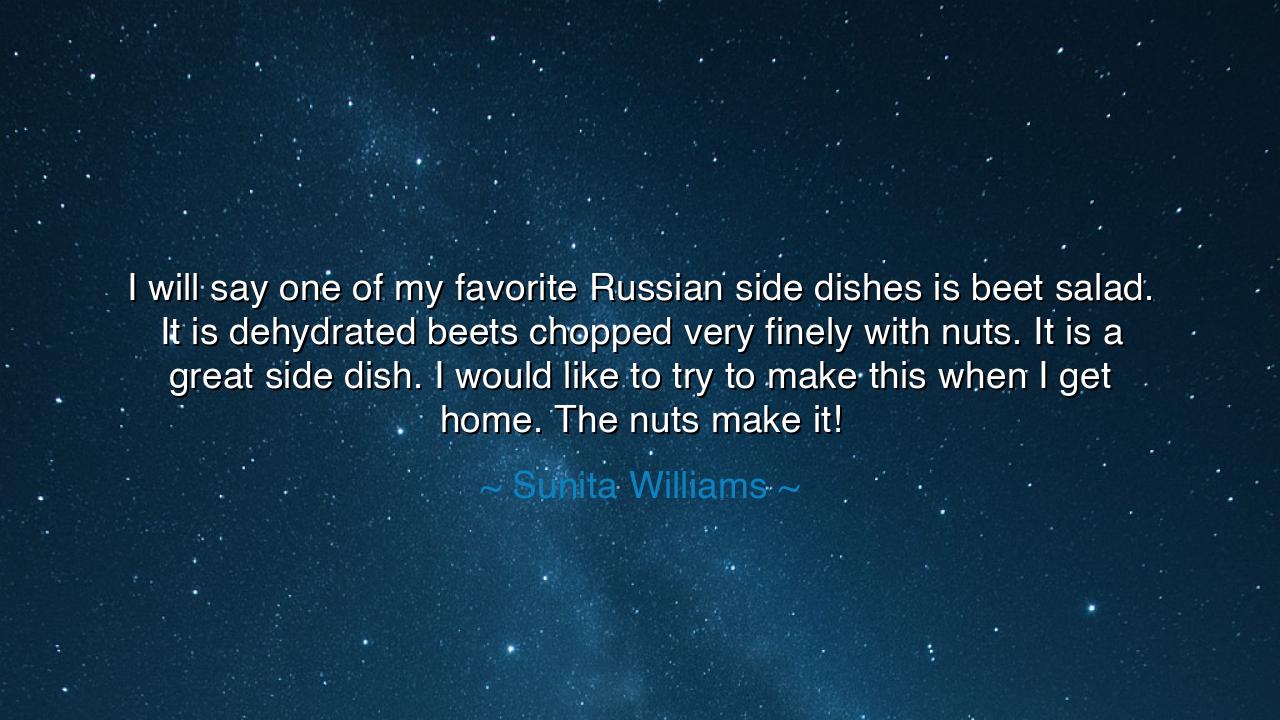
I will say one of my favorite Russian side dishes is beet salad.
I will say one of my favorite Russian side dishes is beet salad. It is dehydrated beets chopped very finely with nuts. It is a great side dish. I would like to try to make this when I get home. The nuts make it!






In the bright, unpretentious words of Sunita Williams—“one of my favorite Russian side dishes is beet salad… dehydrated beets chopped very finely with nuts… I’d like to make this when I get home… the nuts make it”—we hear a hymn to small things that carry great distances. This is not merely a recipe; it is a bridge laid bite by bite between worlds. The tongue remembers what gravity forgets, and a humble side dish becomes a passport stamped with friendship, patience, and joy. In this saying, flavor is a form of fellowship, and home is a destination the palate can point toward long before the landing.
The origin of such affection is the table shared beyond borders—galley tables in orbit where Americans and Russians pass pouches and stories, learning each other’s seasons through food. Up there, where clocks braid and night visits every ninety minutes, a beet salad is not simple garnish; it is a red thread binding crews into a household. To chop “very finely” is to honor detail; to dehydrate is to preserve goodness for the long road. Thus technique becomes metaphor: we keep what matters by lightening it, we concentrate sweetness against the void.
Mark the wisdom tucked inside the last clause—“the nuts make it.” In every enduring thing there is a decisive smallness: a dash of lemon in a soup, a well-placed word in a speech, a hand at the elbow in a crowded station. The nuts give texture, oil, and warmth; they convert mere nourishment into memory. So it is with craft and with character: a single virtue—steadiness, gratitude, humor—often “makes” the whole. The ancients would nod: excellence is granular.
Consider a living story from the high frontier. On the International Space Station, crews from many nations have long practiced a quiet diplomacy of taste—trading tubes and trays, offering “try this,” learning to pronounce each other’s comfort foods. In that cabin chorus, a parcel of beet salad can carry the rustle of birch forests and kitchen conversations, even as solar panels drink the sun. Such exchanges are not trivial. They are proofs that shared side dishes can soften hard histories; that a spoon extended is a treaty signed in ordinary light.
Look further back, and you find the same sacrament on Earth. In caravanserais along the Silk Road, travelers broke bread and cracked nuts across languages, binding routes with recipes. In monasteries, gardeners pulled beets from cold soil and married them to walnuts for winter strength. Time and again the human family discovered: when we cannot share maps, we share meals; and in the sharing we draw new maps in the heart. Food makes foreigners into neighbors, and a dish into a door.
From this, take a lesson fit for all stewards of kinship: let your hospitality be practical and particular. Do not speak only of “unity”; plate it. Learn a friend’s favorite side dish, and make it with your hands. Notice the small element that transforms adequacy into welcome—the toasted nut, the drizzle of oil, the final pinch of salt—and be that element in your circle. Rituals do not have to be grand to be binding; they must only be kept.
Practical counsel follows like measured steps. (1) When you return home—from work, from travel, from sorrow—choose a simple, repeatable recipe that reminds you of the wider world; let beet salad be your liturgy of return. (2) Prepare it the way the saying teaches: dehydrated beets or roasted then chopped very fine, folded with nuts (walnut or hazelnut), a bright acid, a thread of garlic—texture first, then color, then scent. (3) Invite another to your table and ask for their own remembered dish; exchange methods as you would exchange stories. (4) Keep a notebook of these small formulas; over time it becomes a map of friendships.
At last, remember what this cheerful confession proclaims: the cosmos is vast, yet meaning is local; grandeur is good, but goodness is granular. A spoon of beet salad can carry a station’s worth of camaraderie; a handful of nuts can “make it” where machinery cannot. Live, then, as a careful cook of your days. Let the minor note sing; let the decisive detail do its work. And when you speak of love for distant companions, show it in a bowl—bright, textured, and shared.






AAdministratorAdministrator
Welcome, honored guests. Please leave a comment, we will respond soon